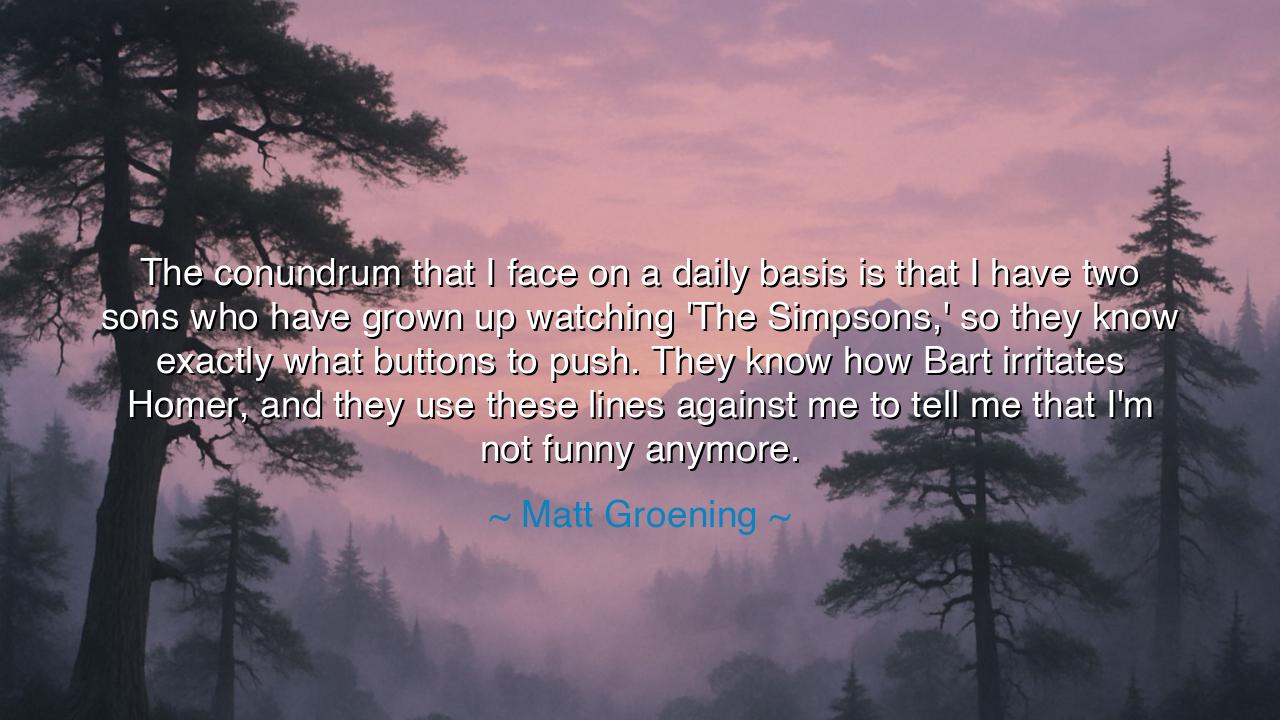
The conundrum that I face on a daily basis is that I have two
The conundrum that I face on a daily basis is that I have two sons who have grown up watching 'The Simpsons,' so they know exactly what buttons to push. They know how Bart irritates Homer, and they use these lines against me to tell me that I'm not funny anymore.






When Matt Groening said, “The conundrum that I face on a daily basis is that I have two sons who have grown up watching The Simpsons, so they know exactly what buttons to push. They know how Bart irritates Homer, and they use these lines against me to tell me that I’m not funny anymore,” he was not merely joking about fatherhood — he was revealing one of the eternal truths of creation: that the creator is eventually outwitted by his own creation. His words carry humor, yes, but beneath the laughter lies the melancholy wisdom of time — the knowledge that art, like life, evolves beyond its maker. Groening, who gave the world the immortal family of Springfield, now finds himself living within his own myth: a father chastised by the very humor he once designed to mock the folly of fathers.
The origin of this reflection lies deep in Groening’s relationship to his art and his family. As the visionary behind The Simpsons, he forged characters that became archetypes of modern humanity — the foolish but loving father, the rebellious son, the patient mother, the clever daughter. These figures became so powerful that they escaped fiction and entered the living world. And now, in his own household, Groening sees the reflection of his own creation — his sons, clever and mischievous, quoting Bart’s rebellion and Homer’s rage, turning his satire into real-life irony. In this, he experiences what every artist and parent eventually must: the reversal of roles, the passing of the torch, and the strange, bittersweet laughter that comes when the student surpasses the master.
The ancients would have known this story well. The Greek titan Cronus, fearing the rise of his children, sought to devour them — for he knew that those who create are often undone by what they create. And yet, it was not through destruction but acceptance that true wisdom lay. For just as Zeus eventually overthrew his father to rule Olympus, so too must every generation challenge and redefine the one before it. Groening’s words are not the lament of a threatened father, but the amused recognition of this ancient rhythm — that children, armed with the humor of their parents, will one day wield it against them. And perhaps, in that rebellion, there is beauty — for it means that the flame of creativity still burns, passed from hand to hand, voice to voice, joke to joke.
But there is also tenderness in Groening’s confession. When he says that his sons tell him he is “not funny anymore,” there is no bitterness — only wonder. The man who shaped the world’s laughter now receives its echo from those he loves most. It is the eternal humbling of the parent, who sees his children not merely as reflections but as independent spirits, sharper, quicker, freer. To be teased by one’s children is to know that they have learned the lessons of humor — that they can laugh even at the master himself. In this way, Groening’s story becomes not about loss of authority, but about legacy fulfilled.
Consider also the deeper metaphor: that humor, like wisdom, is cyclical. Just as The Simpsons taught the world to laugh at its own absurdity, so too do Groening’s children laugh at him — a living proof that comedy is inheritance. Each generation learns to question, to mock, to find joy in imperfection. The laughter of the young is both a rebellion and a continuation, both resistance and reverence. In that laughter, the world renews itself. Just as the medieval fool spoke truth to kings through jest, the child speaks truth to the parent — a gentle revolt that keeps the spirit alive.
There is, too, a reminder of humility — that even the great must bow to time. Groening’s jest carries within it a quiet surrender: the recognition that one cannot remain forever the funniest, the wisest, or the most relevant. Every artist, every thinker, must one day watch their own creation grow beyond their grasp. But in this surrender lies freedom, for to be surpassed is to have succeeded. His sons, in mocking him, are not diminishing his greatness; they are extending it — living proof that his humor endures, not as a monument, but as a living force that continues to inspire laughter and reflection.
So, dear listener, let this be your lesson: embrace the moment when those you’ve taught begin to outshine you. When your children, your students, or your creations challenge you, rejoice — for this is the cycle of life and art. Laugh with them, not above them. Let their humor remind you of your own youth, your own daring, your own first spark of rebellion. As Matt Groening reminds us, the true measure of a creator is not how tightly he holds his work, but how gracefully he lets it grow.
Thus, his words become a parable of wisdom: that even the god of laughter must one day become its subject. The father becomes the fool, the teacher becomes the taught, and the laughter continues, unbroken and eternal. And in that laughter — shared across generations — lies the purest kind of immortality.






AAdministratorAdministrator
Welcome, honored guests. Please leave a comment, we will respond soon